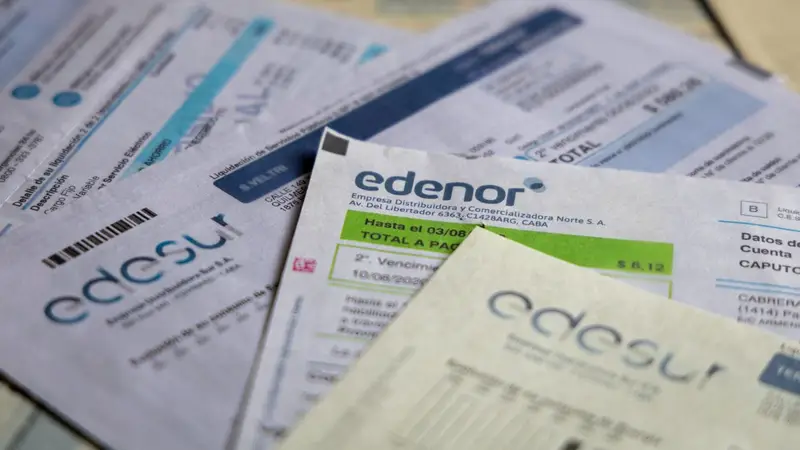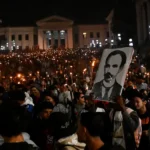
The consumer defense entities grouped in CUNRE denounced that almost 6 million users in the City of Buenos Aires and the Buenos Aires suburbs were forced to pay their bills in advance, based on a request from the electricity companies enabled by the National Electricity Regulatory Entity (ENRE).
According to the calculation of the entities, the advance payment will be made 50% to be paid in December and 50% in January, under the title of “monthly migration adjustment” together with the total amount (of the corresponding month) on the receipts. This additional could generate extra income for the privatized companies Edenor and Edesur in more than 60 million dollars, just when the accounting years for 2025 close.
At the beginning of the month, the ENRE had approved a change in the consumption measurement regulations at the request of companies. Resolution 730/25 provides that the measurement of consumption will go from bimonthly to monthly.
Previously, Mauricio Macri in 2016, with Aranguren as Minister of Energy, had divided the payment of monthly consumption into two installments, since with the high rates they had applied, this expense became unpayable at once. In fact, it ended up being paid monthly.
Now the readings or estimates will be made every 30 days. The distributors accused ENRE in the change request that they handle many complaints from customers who complain about the consumption they are billed, because they do not understand that it is consumption from a couple of months ago. Although they should now send inspectors to measure consumption more often, they say they will save that cost in customer service.
It is worth clarifying that in the absence of investment in smart meters, the readings continue to be in-person or estimated. That is, the company sends personnel to check the meter of each home or, when it does not do so, estimates how much it should have consumed based on certain parameters, such as the time of year and previous consumption, generating complaints from users who detect the inequality of spending on the bill and on their meter.
Discretionary Claims
The user associations denounced that the replacement of the current system was carried out without a prior public hearing with consultation with users and organizations. According to the entities, there is a problem that while the transition lasts on the bills, two charges accumulate in one. “In two months, the amounts of three invoices will be paid. In one, the total amount is paid, plus 50 percent of the next one; and in the other, the total amount added to the other 50 percent,” explained Pedro Bussetti, head of the Defense of Users and Consumers (Deuco).
Users are notified these days with exorbitant amounts on their bills due to lack of communication from ENRE or the distributors. The NGO denounces that “users were not informed and are forced to pay sums corresponding to the next period of consumption, violating the right that all people have to proper information.”
With the new system, invoices arrived with additional amounts of between 10,000 and 80,000 pesos. “If we take into account the number of users of both distributors and subtract the industrial users that are not included in the measure, we have a universe of almost 6 million users to whom an advance payment of the bill is imposed. Taking an estimated figure of 15,000 pesos per user, the advance payment that the distributors would receive would be 90 billion pesos, equivalent to 60.7 million dollars,” Deuco denounced.
Users of @Edenor They receive the bills with a significant plus, under the concept of MONTHLY MIGRATION ADJUSTMENT (?).
Specifically, a 50% increase in billing.— Alejandro Ramos (@AleRamosTN) November 19, 2025
The concessionaires hid the reasons why they charge these amounts: “they do not do so on the invoice and they did not send the user a note prior to the issuance of the invoice, explaining the change in regime and how it would be applied,” Deuco noted. At this point, Bussetti maintains that the associations are not against monthly billing but rather the way in which the collection was decided to be implemented: “It could have been prorated in five or six months instead of three. It seems that they are unaware of the context of families in debt to pay the rates, with amounts that before this decision already occupied in some cases up to 30 or 40 percent of the income.”
The change in regime should have been taken into consideration by users as provided by Law No. 24,065 (National Electrical Regulatory Framework) and Decree No. 1,172/2003. Any modification in the conditions of provision of the public service must be subject to public consultation or hearing, especially when it affects the contractual relationship or the economic rights of users.
“The application of the measure has a very beneficial connotation financially for the distributors and economically and morally detrimental for the users who, faced with payment difficulties, must go to the distributors to request payment facilities, with the inconvenience that this means, especially if there were a large influx of users making the same claim,” explained the organization that defends consumers.
Increases and more benefits
Edesur, controlled by Enel of the Italian state, hinted that this cash relief will allow it to settle debt with the Wholesale Electricity Market Administration Company (Cammesa). The Government had already given the distributors a plan of comfortable installments to settle the debts with Cammesa.
“Edesur pointed out that the previously mentioned time lag has additionally generated a decompensation in the distributor’s collection flow, with respect to the energy payment schedule to Cammesa,” reads the ENRE resolution.
The bills, in addition to the surcharge for the model change, came with an increase of 3.6% for Edenor users and 3.53% for Edesur users authorized by the Government.
Since Milei took office, rates have been raised that have reached 600%. This was reflected in the balance sheets of the companies that celebrated the rate adjustment with exorbitant profits.
Wired Privatization
Summer is approaching, the time of greatest energy consumption, and investments remain unrealized. Given this, the Government seeks to provide a striking solution: contract the contribution of energy and backup power to large users, mainly industries and shopping malls, that have generator sets. The scheme provides for a mechanism similar to an auction: companies and shopping centers will be able to bid on the available capacity.
The successful bidders will receive a fixed charge for keeping their equipment available and a variable remuneration for the energy they actually inject into the system, on the days and times determined by the Administrative Company of the Wholesale Electricity Market SA (Cammesa).
But the Government responded to the lack of investment with more benefits. In March, as part of the Five-Year Tariff Reviews, the ENRE substantially reduced the fines that companies must pay for non-compliance. Resolutions 160 and 162 of 2025 liquefied the fines, by changing the calculation methodology. Thus, companies will pay 40% of what they paid for the same violations.
As if that were not enough, the 2026 Budget project includes compensation of $800,000 million for Edenor and Edesur for the increases that they could not apply before the change of Government.
Source: www.laizquierdadiario.com

